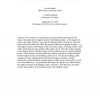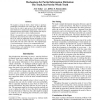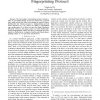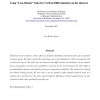115
click to vote
MKTSCI
2010
14 years 8 months ago
2010
Reverse pricing is a market mechanism under which a consumer's bid for a product leads to a sale if the bid exceeds a hidden acceptance threshold the seller has set in advanc...
120
click to vote
WINE
2010
Springer
14 years 12 months ago
2010
Springer
We design algorithms for computing approximately revenue-maximizing sequential postedpricing mechanisms (SPM) in K-unit auctions, in a standard Bayesian model. A seller has K copi...
116
click to vote
TCCI
2010
15 years 12 days ago
2010
According to transaction cost economics, contracts are always incomplete and offer opportunities to defect. Some level of trust is a sine qua non for trade. If the seller is better...
111
click to vote
ISR
2007
15 years 1 months ago
2007
This paper considers a two-stage development problem for information goods with costless quality degradation. In our model, a seller of information goods faces customers that are ...
DA
2010
15 years 2 months ago
2010
: We consider two mechanisms to procure differentiated goods: the request for quote and an English auction with bidding credits. In the request for quote, each seller submits a pri...
110
click to vote
CORR
2008
Springer
15 years 2 months ago
2008
Springer
Many advertisers (bidders) use Internet systems to buy advertisements on publishers' webpages or on traditional media such as radio, TV and newsprint. They seek a simple, onl...
129
click to vote
AAAI
2006
15 years 3 months ago
2006
We examine a setting in which a buyer wishes to purchase probabilistic information from some agent. The seller must invest effort in order to gain access to the information, and m...
122
click to vote
ICC
2007
IEEE
15 years 8 months ago
2007
IEEE
— The buyer-seller watermarking protocol enables a seller to successfully identify at least one traitor from a pirated copy, while prevent the seller from framing an innocent buy...
101
click to vote
HICSS
2010
IEEE
15 years 9 months ago
2010
IEEE
In Internet based commerce, sellers often use multiple distribution channels for the sale of standard consumer goods. We study a model of second degree price discrimination in whi...




